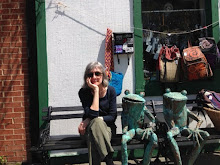This summer I attended an event featuring three elderly Holocaust survivors. S, one of the survivors, seemed to be hard of hearing. I had that impression because his comments were consistently unrelated to the interviewer’s questions. He also seemed to be increasingly distraught as the evening went on. Eventually I realized what was happening.
It wasn’t about his hearing loss. He was purposefully ignoring the interviewer’s questions. Why? The constraints of the interviewer’s questions did not permit S to tell his story of suffering and survival in a way that allowed him to feel heard. So instead, whenever it was his turn to respond, he turned to the audience and cried out a heart-wrenching “I want you to know….” And then he would tell another piece of his story.
S had directly faced death many times as a young teenager during the Holocaust; he said he had no fear of death, and I believe him. But his behavior during the panel discussion touched a nerve in me around a different kind of fear.
I don’t have a simple word or expression for this kind of fear, so let me say it in a few different ways:
We are afraid of passing through life without having been known; without our stories having been heard.
We are afraid of passing through life without having touched someone else’s life.
We are afraid that our life and our suffering will not have meant something.
We are afraid that our experiences, our learning, our wisdom, might not be appreciated or transmitted.
We are afraid of not mattering.
One corollary of this fear is our insecurity about whether we are doing “enough,” or whether we are doing “important” things, compared to what other people seem to be doing.
An early rabbinic teaching addresses this kind of fear. It’s one of my favorite teachings from the Talmud. I want to share it with you, and then ask you to reflect on its relevance for your own life. Here is the teaching:
I am a created being, and my fellow human is a created being. I work in the city, and they work in the field.
I get up early to do my work, and they get up early to do their work. Just as they don’t presume to do my work, I don’t presume to do their work.
Lest you say “I do a lot and they do a little,” we are taught that whether one does a lot or a little, what matters is that one directs one’s heart toward heaven. (Berachot 17a)
“Whether one does a lot or a little, what matters is that one directs one’s heart toward heaven.” I’d like to ask you now: How do you understand this expression? How is it relevant to your life? What do you hear as the message of this teaching?
[discussion]
So we’re talking in different ways about this fear we have of not mattering. Our tradition offers one possible antidote to this kind of fear: Faith. Recognizing the limitations of our human ability to truly know and appreciate one another, faith offers the possibility that on a deeper level we are known and loved just as we are. We can feel ourselves to be transparent in the light of God’s love, however we understand that image. And we can also strive to bring a bit of that light into our relationships with one another.
Which brings me to another possible antidote to this kind of fear: relationships. The more we are able to share of ourselves in relationship, the more we see reflected back to us that we do indeed matter. We serve as soul mirrors for one another.
And this suggests that we have a sacred responsibility to one another, to be that soul mirror. To let people know – through our attentiveness, through our full-bodied listening and responding – that they are known; that their stories have been heard.
To let people know – that they have touched our lives.
To let people know – that their life and their suffering have meant something to us.
To let people know – that their experiences, learning, and wisdom are appreciated.
To let people know – that they do indeed matter.
So now I would like to ask you all to share something with someone sitting near you, to be those soul mirrors for one another. Here’s the simple instruction:
Find a buddy. Then say to your buddy: “I want you to know…” and finish the sentence with one thing about you, or one thing that you have done in your life, that matters.
Your buddy should then respond: “I hear that you….”
Then switch. One sentence each. One minute each. Go!
May we each find ways in the coming year – beginning right here, right now – to be a soul mirror for everyone we encounter. So that we may all come to know and trust that whether we do a lot or a little, we all matter.
